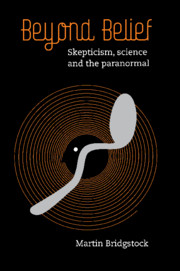Book contents
- Frontmatter
- Contents
- Preface
- Introduction: The paranormal and why it matters
- Chapter 1 The nature of science
- Chapter 2 The paranormal
- Chapter 3 Skepticism – from Socrates to Hume
- Chapter 4 Modern skepticism
- Chapter 5 Bringing skepticism down to earth
- Chapter 6 Skepticism, ethics and survival
- Chapter 7 Skepticism beyond the paranormal
- Bibliography
- Index
Chapter 4 - Modern skepticism
Published online by Cambridge University Press: 05 April 2010
- Frontmatter
- Contents
- Preface
- Introduction: The paranormal and why it matters
- Chapter 1 The nature of science
- Chapter 2 The paranormal
- Chapter 3 Skepticism – from Socrates to Hume
- Chapter 4 Modern skepticism
- Chapter 5 Bringing skepticism down to earth
- Chapter 6 Skepticism, ethics and survival
- Chapter 7 Skepticism beyond the paranormal
- Bibliography
- Index
Summary
Where shall we set the beginning of modern skepticism? As we have seen, the modern skeptical movement can trace its roots back to David Hume and René Descartes in the Enlightenment. Francis Bacon, a courtier in the court of King Henry VIII, could be called a skeptic. We could also look at many important skeptics in the nineteenth century, such as Herbert Spencer, and early twentieth century skeptics such as Harry Houdini (1980). Later on we will look at one of these early skeptics, William Clifford. However, most modern skeptics regard a clear and simple sequence of events as marking the founding of the modern movement.
The key event is the publication in 1952 of a book by the polymath writer Martin Gardner, titled In the Name of Science. The book did not sell well in its original incarnation, but it was reissued in 1957 under a different title, Fads and Fallacies in the Name of Science (Gardner 1957) and it has remained in print ever since. Half a century later, its contents are intriguing, and we will review them in a moment.
By itself, Gardner's book made little perceptible difference. However, in 1975 a statement appeared in Science News titled ‘Objections to Astrology’ (Bok et al 1975), signed by a number of Nobel Prize winning scientists. The following year a conference was held in Buffalo, New York, on ‘The New Irrationalisms: Antiscience and Pseudoscience’.
- Type
- Chapter
- Information
- Beyond BeliefSkepticism, Science and the Paranormal, pp. 86 - 110Publisher: Cambridge University PressPrint publication year: 2009



